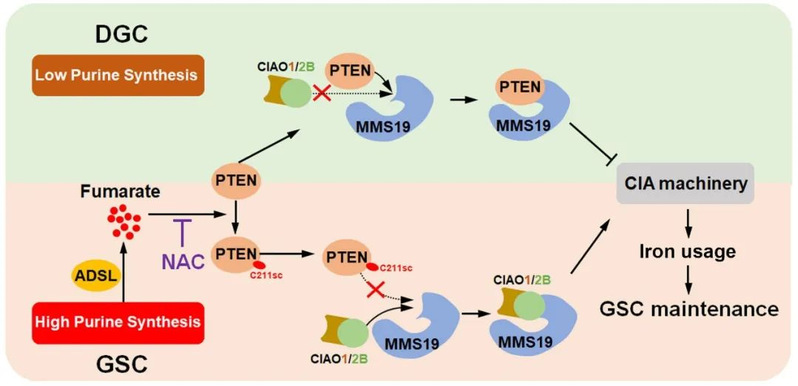Dr. Qian and his group reveals a new mechanism for inhibiting gliomas through PTEN reactivation and inhibited Fe-S utilization.
On March 20, 2024, a publication titled "Reactivating PTEN to impair glioma stem cells by inhibiting the cytosolic iron-sulfur assembly pathway" was authored by Prof. Xu Qian from the School of Public Health at Nanjing Medical University, Prof. Xiuxing Wang from Basic Medical College, and Prof. Yongping You from the First Affiliated Hospital of Nanjing Medical University in Science Translational Medicine. This study elucidates the pivotal role of succinated PTEN mediated by fumarate, a cancer-promoting metabolite, in preserving the stemness of glioma stem cells (GSCs), as well as conferring resistance to radiotherapy and chemotherapy.

Glioblastoma (GBM) is the most lethal primary brain tumor, and current therapeutic approaches involving maximal surgical resection followed by concurrent chemo-radiation and adjuvant chemotherapy only provide palliative care, with a median overall survival of less than 15 months from diagnosis. GBMs consist of diverse cell populations enforced by glioma stem cells (GSCs), which not only initiate and sustain malignant phenotypes but also enhance therapy resistance. Phosphatase and tensin homologue (PTEN) is a well-established tumor suppressor frequently affected by inactivation mutations in gliomas, particularly GBM. Prof. Xu Qian's laboratory has conducted numerous studies on tumor metabolism, wherein previous research has demonstrated that PTEN functions as a protein phosphatase that dephosphorylates autophosphorylated phosphoglycerate kinase 1 (PGK1), thereby inhibiting glycolytic enzyme activity of PGK1, leading to suppression of glycolysis and inhibition of brain tumor growth (Molecular Cell, 2019). Despite frequent mutation occurrence in GBMs, PTEN remains intact in a substantial subset of GSCs. Consequently, further investigation is warranted to elucidate the mechanisms underlying functional inactivation of PTEN specifically within GBM-associated GSCs while exploring strategies for reactivating PTEN to exert its oncogenic effects.
This study revealed that PTEN directly interacts with MMS19 and competitively disrupts the cytosolic iron-sulfur (Fe-S) cluster assembly (CIA) machinery mediated by MMS19 in differentiated glioma cells. Previously reported by Qian lab, succination of PTEN, a newly identified post-translational modification, hinders its localization on the cellular membrane, thereby attenuating its inhibitory effect on the PI3K/AKT pathway (Molecular Cell, 2022). Furthermore, this study demonstrates that fumarate generated through adenylosuccinate lyase (ADSL) in the de novo purine synthesis pathway succinates PTEN at C211. This modification abolishes the interaction between PTEN and MMS19, consequently reactivating the CIA machinery pathway in GSCs.
Finally, this study investigated the clinical translational potential of targeting fumarate to enhance the efficacy of glioma treatment. N-acetylcysteine (NAC), an FDA-approved prescription drug, possesses a free sulfhydryl group that can readily engage in Michael addition reaction with fumarate, thereby depleting intracellular fumarate levels. This study unveils an immediately implementable strategy for selectively targeting glioblastoma stem cells (GSCs) through combination therapy involving repurposed NAC.

Prof. Xu Qian from the School of Public Health of Nanjing Medical University, Prof. Yongping You form the Department of Neurosurgery of the First Affiliated Hospital of Nanjing Medical University and Prof. Xiuxing Wang from the School of Basic Medical Sciences of Nanjing Medical University are the co-corresponding authors of the work. Jianxing Yin, a postdoctoral fellow at Gusu College of Nanjing Medical University, Prof. Xin Ge, and Fangshu Ding, a Ph.D. candidate, from the School of Public Health of Nanjing Medical University are the co-first authors of the work.
Link to original article: https://www.science.org/doi/10.1126/scitranslmed.adg5553

